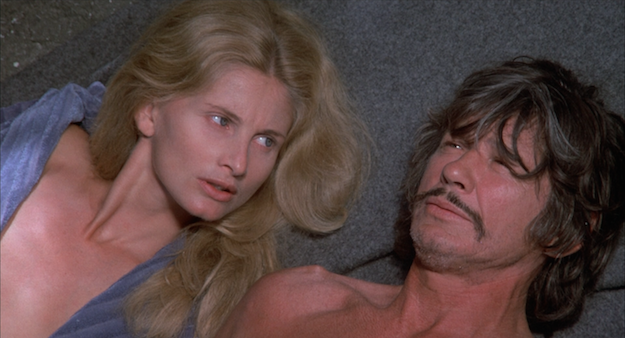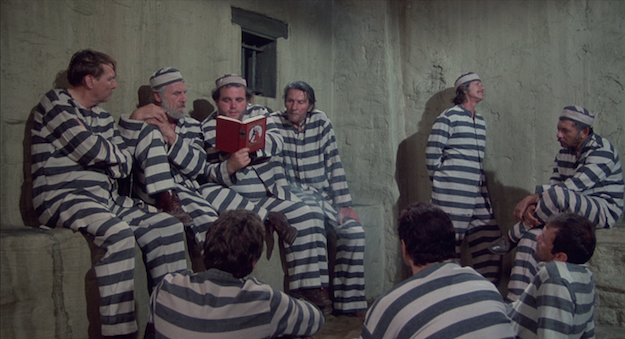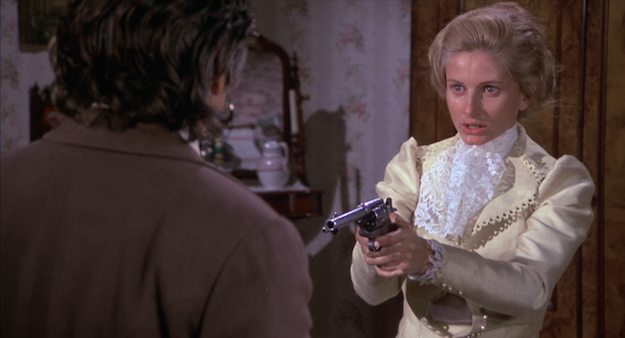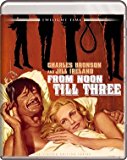| Reviews & Columns |
|
Reviews DVD TV on DVD Blu-ray 4K UHD International DVDs In Theaters Reviews by Studio Video Games Features Collector Series DVDs Easter Egg Database Interviews DVD Talk Radio Feature Articles Columns Anime Talk DVD Savant Horror DVDs The M.O.D. Squad Art House HD Talk Silent DVD
|
DVD Talk Forum |
|
|
| Resources |
|
DVD Price Search Customer Service #'s RCE Info Links |
|
Columns
|
|
|
From Noon Till Three
The Movie:

Charles Bronson gets the opportunity to play against type, as both a sly comedian and a romantic lead, in the self-consciously odd 1976 western From Noon Till Three.
Written and directed by Frank D. Gilroy, the Pulitzer-winning playwright behind The Subject Was Roses and The Only Game in Town, From Noon Till Three initially plays out as one of those hogwash Hollywood romances where a gruff, earthy man makes a prim, uptight woman fall in love with him by sheer force of will. But, in the film's trickier second half, it manages to deflate and subtly criticize the tropes of this type of Taming of the Shrew knock-off.
In the beginning, fate flings together Bronson's two-bit outlaw Graham Dorsey with Amanda, a pretty young widow played by Bronson's actual wife and frequent costar, Jill Ireland. Graham is supposed to take part in a bank robbery with his gang, but his horse breaks a leg. The gang stops by Amanda's impressive old mansion to see if she has a spare horse to buy (or steal). Amanda lies about owning a horse, and Graham, who has had a foreboding premonition about this job, plays along with the lie. He plans to lay back at Amanda's and have the gang pick him up when the job is done, in roughly three hours.
Well, if you've seen the poster art on the Blu-ray cover, you pretty much know where this is headed. Graham forces Amanda to open up rooms in her mansion that she has kept closed since her husband died, as a prelude to opening up her heart to him. Well, sort of her heart: more like her pants. For his part, Graham fondles, cajoles, and eventually connives to get Amanda into a compromising position. For viewers weary of cinematic rape culture, it might be cold comfort that Graham and Amanda come together only after he lies about being impotent and she obliviously offers to help, but hey, at least he waited for consent. Bronson's uncomplicated, cocksure attitude cements his performance here as being from a bygone era, but his sense of humor is warmer and far less prickly than Clint Eastwood's when Eastwood is being "fun."
After Graham and Amanda's roll in the hay, the mismatched couple realize that they really like -- and maybe even love -- each other, but the affair is cut short. News comes that the gang of robbers has been captured and, though Graham is honestly just fine with that, Amanda guilts him into riding toward town to save his colleagues. Along the way, Graham swaps clothes with a con man to avoid a posse, only to wind up tossed in prison for the con man's crimes. Granted, the con man got it worse: he wound up dead.
At this point, the film starts to mutate into something unexpected. Amanda believes the love of her life is dead, and she commemorates her epic romance in book form. The book becomes an international phenomenon that inspires songs, plays, tourism, and merchandising. Naturally, word gets back to Graham that he is now essentially Rhett Butler before Rhett Butler, and once he is freed from prison, he goes to visit Amanda at her mansion once again.
There's just one problem: Amanda doesn't recognize him as the man in the story. The man in the story is taller, more handsome, and more dashing. And soon, all sorts of people from Graham's life no longer recognize him as himself. They too have replaced their mental picture of him with that of an idealized dead man. Ireland, who is hamstrung by the relatively flat nature of her character in the early going, really gets to shine in these later scenes. When confronted with the uncomfortable truth, Ireland elegantly demonstrates how Amanda must temper her sentimentality with cold pragmatism. Bronson is arguably better in these later scenes, too, as his character is forced into an unlikely existential crisis, unable to prove he is who he is.
The way that the actors rise to meet the material and get just a wee bit out of their comfort zones is one of the key pleasures of From Noon Till Three. Longtime fans of Bronson and Ireland might be surprised, but it'll be a good surprise.

The Blu-ray
From Noon Till Three is available in a limited edition of 3000 copies. The disc is packaged with a color booklet featuring a liner-note essay by Twilight Time's Julie Kirgo.
The Video:
Color- and clarity-wise, this AVC-encoded 1080p 1.85:1 presentation is a big upgrade over the lifeless, muddy SD version of this film currently circulating on cut-rate DVDs. Skin-tones are more vivid and life-like. The cinematography is pretty meat-and-potatoes, but there are instances of rich, saturated color, like Amanda's red dress or Graham's green plaid suit. There's still some sporadic dirt and damage, and detail is a little soft in wider shots, but this all looks like an accurate representation of the original film image.
The Audio:
The soundtrack is relatively sedate in this DTS-HD MA 2.0 mono audio mix, but it all sounds clear and relatively well-defined. Elmer Bernstein's musical score, including the Golden Globe-nominated song "Hello and Goodbye," has many moments of unexpected delicacy that translate well in this presentation. One subtitle option: English SDH.
Special Features:
- Elmer Bernstein's music, presented in DTS-HD MA 2.0 mono. It's a fun score, worth savoring on its own.
Final Thoughts:
Charles Bronson does not have the reputation of being a fun-loving guy onscreen, which is largely why this western comedy romance works. The result is not earth-shattering, but it makes for a pleasant experiment that shows off a rarely explored side of this tough guy actor. Recommended.

Justin Remer is a frequent wearer of beards. His new album of experimental ambient music, Joyce, is available on Bandcamp, Spotify, Apple, and wherever else fine music is enjoyed. He directed a folk-rock documentary called Making Lovers & Dollars, which is now streaming. He also can found be found online reading short stories and rambling about pop music.
|
| Popular Reviews |
| Sponsored Links |
|
|
| Sponsored Links |
|
|
| Release List | Reviews | Shop | Newsletter | Forum | DVD Giveaways | Blu-Ray | Advertise |
|
Copyright 2024 DVDTalk.com All Rights Reserved. Legal Info, Privacy Policy, Terms of Use,
Manage Preferences,
Your Privacy Choices | |||||||














